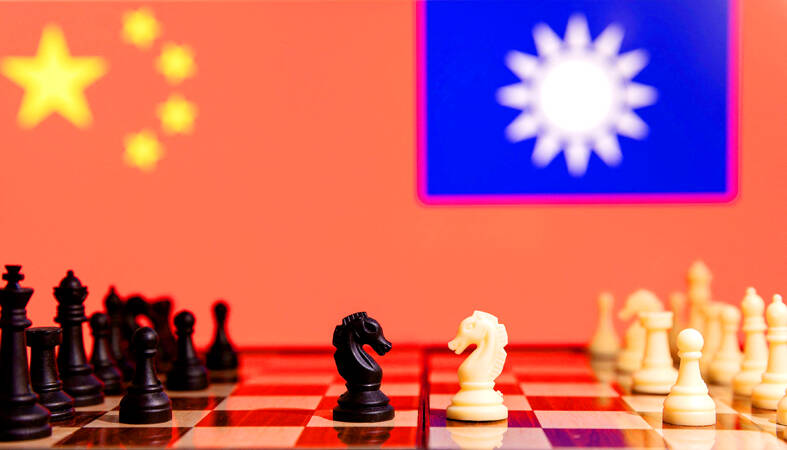Beijing is using statements made by Taiwanese political pundits to create a pro-China worldview, an Information Operations Research Group study found.
In a report published on Tuesday, the group listed 10 Taiwanese political pundits who were cited the most from July to September by Douyin (抖音) accounts that were controlled by Beijing or its state media.
The 10 pundits include former representative to New Zealand Dale Jieh (介文汲), former army colonel Lai Yueh-tchienn (賴岳謙), former legislator Julian Kuo (郭正亮), former Chinese Nationalist Party (KMT) legislator Alex Tsai (蔡正元), retired lieutenant general and former KMT legislator Herman Shuai (帥化民), Hsieh Han-tung (謝寒冰), radio host Tang Hsiang-lung (唐湘龍), KMT vice presidential candidate and Broadcasting Corp of China chairman Jaw Shaw-kong (趙少康), retired major general Li Cheng-chieh (栗正傑) and KMT Legislator Wang Hung-wei (王鴻薇), the report said.

Photo: Dad Ruvic, Reuters
The remarks most frequently quoted were related to topics such as US skepticism, the US being the source of global chaos, protesting against the discharge of the treated nuclear wastewater from Japan’s disabled Fukushima Dai-ichi nuclear power plant, praising Huawei and the cross-strait situation, it said.
The pundits have a “division of labor” on the topics they discuss — Jieh criticized US foreign policy and the democratic system using his diplomatic background; politicians and media personnel criticized the Democratic Progressive Party for its poor governance; and retired military personnel said that Taiwan’s armed forces could not defeat the Chinese People’s Liberation Army, it said.
Lai and Tang often said that Taiwan is a part of China, and Jaw appeared in many of the cited clips as a host of political commentary programs, it said.
The five accounts that cited Taiwanese pundits most often in order of frequency belong to Taihai Net and the Strait Herald under the Fujian Daily Newspapering Group, Taiwan.cn of the China’s Taiwan Affairs Office, Huaxia Jingwei and China Daily, the report said.
The Fujian Daily Newspapering Group is subordinate to the Chinese Communist Party’s (CCP) Fujian Committee, it said.
For the CCP, Taiwanese pundits are “more important and influential” than the nation’s president and presidential candidates, the study said.
The number of views gathered by the 10 most cited pundits was 6.53 times more than President Tsai Ing-wen (蔡英文), the DPP’s presidential candidate Vice President William Lai (賴清德), the KMT’s presidential candidate, New Taipei City Mayor Hou You-yi (侯友宜), and Taiwan People’s Party’s Chairman and presidential candidate Ko Wen-je (柯文哲) combined, it showed.
There were 2.41 times more videos including the 10 pundits than those that included the president or candidates, and the total length of these videos was 3.59 times longer, it showed.
The pundits were frequently cited as the remarks they made helped the CCP to create a biased image of Taiwan and a worldview that is in line with Beijing’s interests, it said.
The study urged the public to be more cautious while participating in public discussions and be aware that pundits are being used by the CCP as “public opinion weapons.”

Eight restaurants in Taiwan yesterday secured a one-star rating from the Michelin Guide Taiwan for the first time, while three one-star restaurants from last year’s edition were promoted to two stars. Forty-three restaurants were awarded one star this year, including 34 in Taipei, five in Taichung and four in Kaohsiung. Hosu (好嶼), Chuan Ya (川雅), Sushi Kajin (鮨嘉仁), aMaze (心宴), La Vie by Thomas Buhner, Yuan Yi (元一) and Frassi in Taipei and Front House (方蒔) in Kaohsiung received a one-star rating for the first time. Hosu is known for innovative Taiwanese dishes, while Chuan Ya serves Sichuan cuisine and aMaze specializes

Taitung County is to launch charter flights to Malaysia at the end of this year, after setting up flights to Vietnam and Thailand, the Taitung County Government said yesterday. The new charter flight services, provided by low-cost carrier Batik Air Malaysia, would be part of five-day tour packages for visits to Taitung County or Malaysia. The Batik Air charter flight, with about 200 seats, would take Malaysian tourists to Taitung on Dec. 30 and then at 12:35pm return to Kuala Lumpur with Taiwanese tourists. Another charter flight would bring the Taiwanese home on Jan. 3 next year, arriving at 5:30pm, before taking the

Taiwan High Speed Rail Corp. (THSRC) plans to ease strained capacity during peak hours by introducing new fare rules restricting passengers traveling without reserved seats in 2026, company Chairman Shih Che (史哲) said Wednesday. THSRC needs to tackle its capacity issue because there have been several occasions where passengers holding tickets with reserved seats did not make it onto their train in stations packed with individuals traveling without a reserved seat, Shih told reporters in a joint interview in Taipei. Non-reserved seats allow travelers maximum flexibility, but it has led to issues relating to quality of service and safety concerns, especially during

STATS: Taiwan’s average life expectancy of 80.77 years was lower than that of Japan, Singapore and South Korea, but higher than in China, Malaysia and Indonesia Taiwan’s average life expectancy last year increased to 80.77 years, but was still not back to its pre-COVID-19 pandemic peak of 81.32 years in 2020, the Ministry of the Interior said yesterday. The average life expectancy last year increased the 0.54 years from 2023, the ministry said in a statement. For men and women, the average life expectancy last year was 77.42 years and 84.30 years respectively, up 0.48 years and 0.56 years from the previous year. Taiwan’s average life expectancy peaked at 81.32 years in 2020, as the nation was relatively unaffected by the pandemic that year. The metric